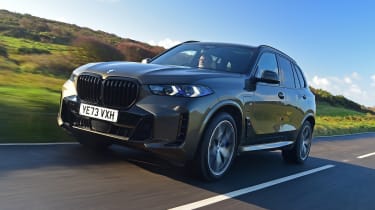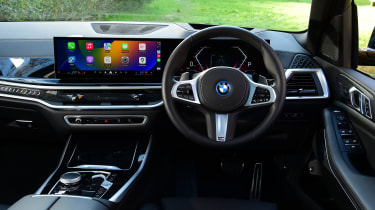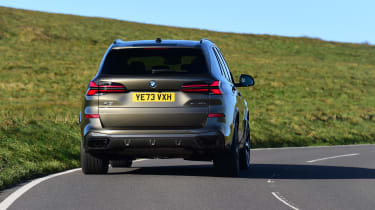New BMW X5 xDrive50e review: plug-in hybrid power enhances an already solid SUV package
Updates to the BMW X5 only consolidate an impressive all-round package, bolstered by this excellent plug-in powertrain

Verdict
The BMW X5 has long been a great choice for anyone looking for a luxurious family SUV – an accolade that’s deserved now more than ever. This is a superbly built, refined, high-tech, spacious and comfortable SUV, and when fitted with the well sorted plug-in powertrain only extends its spread of capabilities. It is, however, big and very expensive.
The BMW X5 SUV has long held a convincing set of attributes for anyone looking for a luxurious and desirable family car. But four generations on, the latest model might just be the best yet.
Available with a range of petrol, diesel and plug-in hybrid powertrains, it’s the latter we’re driving here. This version has found a particular resonance in Europe, helped in no uncertain terms by the financial benefits to its owner’s tax bill.
As part of its recent mid-life update, the X5 xDrive50e gets an extra 95bhp compared with the previous 45e, thanks to some significant upgrades to its electric motor (now 194bhp) and battery (25.7kWh). Combined with the 3.0-litre straight-six petrol engine, the plug-in X5 now produces an impressive 483bhp and 700Nm of torque.
Claimed fuel economy has risen to 353mpg, and the electric range now stands at somewhere between 60 and 70 miles, although on our test in wintery conditions yielded around 50 miles from a full charge.
More reviews
Car group tests
In-depth reviews
Long-term tests
Road tests
- New BMW iX5 Hydrogen 2023 review
- New BMW X5 M Competition 2021 review
- New BMW X5 xDrive45e 2019 review
Used car tests
The uprated powertrain tech doesn’t come cheap, though, with a starting price of just under £80,000, and a lengthy list of options that can see that figure rise to over £100k. Our car featured leather seats that are heated, ventilated and massaging, while other high-end options were generally bundled into packages. These include the M Sport Pro package, which combines some sportier styling elements and larger 21-inch wheels. You get 20-inch items as standard.
On first impressions, it certainly presents well, with the styling changes sharpening up what was already an attractive design. Inside, the cabin is superbly built, with a commanding driving position and an impressive suite of tech features that feel sharp and up to date.
On the road it’s impossible not to be blown away by the X5’s superb refinement and comfortable ride. With a fully-charged battery, it’s easy to forget there’s a straight-six petrol engine under the bonnet; the X5’s powerful electric motor is more than capable of hauling its not-inconsiderable mass with ease.
Around town, the excellent forward visibility and light steering make it easy to place and surprisingly simple to drive in tight spaces – despite its big external dimensions. The ride is very well judged, appearing plush without feeling over-soft.
With the battery depleted, the engine will fire up almost imperceptibly, leveraging its inherent smoothness to create an impressive sense of calm. Dig a little deeper, though, and the X5 feels rapid – with impressive acceleration bolstered by the e-motor’s instant torque.
Being a modern BMW, there are lots of settings to play around with, and in Hybrid mode the car will flow along the road with little indication of whether it’s the petrol or electric motor providing drive. In Sport, however, the petrol engine becomes far more vocal, and drives much more akin to a pure petrol car, only with an added lump of electric power and torque.

Calibrating complex plug-in hybrid powertrains like this is a very tricky task for any manufacturer. But BMW seems to have a good hold on it in the X5, rarely feeling caught out or confused by sudden inputs. We only found it crossed up once or twice when pulling out of junctions with urgency, where the engine and motor join forces to give you perhaps a little too much performance. But in general the system is more adept than those found in this car’s key rivals.
As with all plug-in hybrids, economy does suffer when the battery is used up. Over the course of our test we covered 450-odd miles in mixed city and motorway driving, achieving around 43.5mpg. This sounds impressive for a car of this size, but 184 miles of those were completed in all-electric mode, meaning that actual fuel consumption for the distance covered on petrol power stood at just 25.9mpg. If you consistently drive long distances and exceed the electric range between charging, a diesel-powered X5 will be more efficient. The X5 also only accepts 11kW AC charging, so a full battery refill will take over 4 hours.
The rest of the package is typical X5, which means there’s lots of space in the second row, and a large square boot accessible through a powered split tailgate. The plug-in hybrid does have a touch less boot space than other X5s, with 500 rather than 650 litres. Nor does BMW offer seven-seat options on UK models, leaving that end of the market for the larger X7.
Against key rivals, the X5 is still on top when it comes to striking a balance between a comfortable and luxurious driving experience, but still feeling balanced and fun to drive. A Porsche Cayenne E-Hybrid is more overtly sporty, with a firmer ride and sharper steering, while the softer Mercedes GLE 400e can feel more cumbersome without being any more comfortable. Balance is a talent that that X5 has always possessed, and that continues four generations in.
| Model: | BMW X5 xDrive50e M Sport |
| Price: | £79,265 |
| Engine: | 3.0-litre turbo-petrol, plug-in hybrid |
| Power/torque: | 483bhp/700Nm |
| Transmission: | Eight-speed auto, four-wheel drive |
| 0-62mph: | 4.8 seconds |
| Top speed: | 155mph |
| Economy/CO2: | 353mpg/19g/km |
| On sale: | Now |






